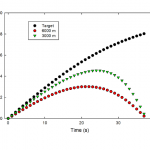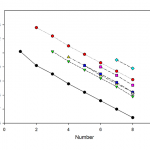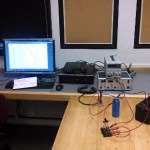
So, last week I idly wondered about the canonical falling-bomb whistle. The was originally intended to be a very short post just asking the question, but I got caught up in thinking about it, and it ended up being more substantial. And leaving room for further investigation in the form of, you guessed it, VPython simulations.
This one isn't terribly visual, so you don't get screen shots, just a link to the code at Gist. It's a simulation of a falling bomb, with air resistance, tracking the velocity as a function of time. Then it calculates a "Doppler shift" using the velocity as a fraction of…
I alluded to this on Twitter, and meant to leave that be, but the other thing I was going to blog today didn't come together, and I probably shouldn't leave a cryptic tweet as my only comment. So...
One of the links getting passed around a lot in my social-media circles is this Tumblr post from Ben Lillie on The Humanities of Science Communication, which argues that discussions of the science of communication often seem to ignore the expertise of people who communicate for a living-- playwrights, actors, journalists, etc. This is a good point, but the post as a whole bugged me a bit, because…
In which Rhett and I talk about Cosmos. What, you thought there would be another topic? We have contractual obligations, you know...
Okay, there were some other topics like Battlestar Galactica (both versions), why so much of what's on Discovery Channel and TLC sucks these days, the flawed astrophysics of Firefly, speculation about how those little infrared thermometers work, and why some kinds of labs are hard.
And Cosmos again. Because, really, how could we not?
It says here in the fine print that my blogging license could be revoked if I fail to offer a public opinion on the Cosmos reboot, which premiered last night. I missed the first couple of minutes-- I had The Pip for bedtime, and he didn't start snoring until 8:58-- but saw most of it in real time. I posted a bit of commentary on Twitter, but will offer something marginally less ephemeral here.
The show opened and closed with tributes to Carl Sagan, and Neil deGrasse Tyson standing on the same cliff where Sagan opened the original series back in 1980. That was good and fitting, and Tyson's…
One of the endlessly recurring topics around here is the use of PowerPoint and comparable presentation software. Usually because of some ill-informed rant against the use of PowerPoint.
It's come around yet again in a particularly ironic fashion, via an online slideshow at Slate, the only medium more consistently exasperating than a bad PowerPoint presentation. In keeping with modern tastes, this has been re-shared so many times that I finally went to look at it, but it's more of the usual, in a more annoying medium. This is a bit of a shame, as there's actually some good presentation advice…
Not that long ago, SteelyKid was doing something violent with toys (she's very tough, as you can see from the featured image above), and in the process made the canonical falling-bomb whistle noise. And it occurred to me to wonder, why that sound?
I mean, I've seen footage of falling bombs and the canonical sound seems like an accurate enough. But I'm not sure I understand it from a physics perspective. Specifically, when you do the falling-bomb whistle, you do a whistle that decreases in pitch. But the bomb is falling faster as it approaches the ground, so if anything, I would expect the…
Given the academic circles I run in, it's not surprising that one of the most repeated stories crossing my social media feeds yesterday had to do with the changes to the SAT. Starting in 2015, the essay section will no longer be mandatory, and they're going to reconfigure the reading and math sections to emphasize different categories of questions.
My slightly cynical take on this is that changes seem to be driven more by marketing than education-- stories about this all mention that the changes make the new SAT more like the ACT, which has been gaining in popularity in recent years. Which…
In which we move out of the original trilogy, and into J.J. Abrams territory. Cue the lens flare!
This week's random assortment of topics includes travel, airports, physics models of loading and unloading planes, uses and abuses of curve fitting, odd stuff we get sent to review, and high-speed video cameras.
Miscellaneous links:
-- Rhett's Atlanta airport post.
-- The airplane loading study I was thinking of is Optimal boarding method for airline passengers, by Jason Steffen, from 2008.
--The Slo Mo Guys, Smarter Every Day, Veritasium.
--Trespassing on Einstein's Lawn by Amanda Gefter.
That'…
In October 1988, I trashed my parents' basement in order to get into college.
OK, the causal connection is a little indirect, but it's there. I was applying to college that fall, and needed to write an essay to go with my application. I've always been able to write stuff with very little effort, so I banged out something that I thought was adequate, and showed it to my guidance counselor, who said "No way." My parents backed her up on this, and I had to go write another one.
The problem was that while what I had written was reasonably polished, it was also glib and superficial-- because I'm…
This year's "Flame Challenge" asks scientists to explain color in terms an 11-year-old can understand. The rules limit answers to either 300 words of text or a 6-minute video. 300 words is ridiculously short, so video is clearly the way to go. Of course, I'm not much of a video expert, but then, one of the finalists last year (when the question was "What Is Time?") was just a guy talking into a webcam, and hell, I can do better than that. So I did this:
(This is, obviously, why I was fooling around with looking at the spectrum of light from my laptop a little while back...)
The approximate…
Kate has been cutting The Pip's hair a little bit at a time, and this morning he demanded a trim. This is a somewhat fraught process, as he's two, and thus tends not to hold still very well. While Kate was trying to get him arranged, SteelyKid came bouncing into the bathroom to "watch," which is a sure route to disaster.
"C'mon, SteelyKid," I said. Let's go see what's in the bedroom, so The Pip doesn't get distracted."
"Distracted?"
"Well, Mommy's cutting his hair, so it's important that he not move. And if you're in there, he might want to move around to look at you."
"Oh, yeah. And he likes…
I got book edits this week, gave an exam on Thursday, and pre-registration for our spring term classes is just beginning, so I have a parade of students begging to get into this course or that one to deal with. So I have no more time for detailed blogging, but will do a bit of tab-clearing to end the week.
This piece about bimodal exams resonated well with my experiences in intro classes. I see a lot of the same thing, though with less statistical power, given that our maximum class size is 18. But in general, the "well-prepared students are bored, poorly-prepared students hopelessly lost"…
Last week, we looked at the resistance of a voltage sensor by using the discharge of a capacitor, getting a value that was a bit high, but not wildly out of line with the specs. This time out, we're going to look at the resistance of a current meter, because some students asked about it during Wednesday's exam review session.
The question came up because one of the things I have on the standards for the circuit portion of the class is knowing how to hook up a current meter and a voltage meter in the appropriate ways. This is strangely confusing for a lot of students, which gets annoying, as…
Matt Reed, who will forever be "Dean Dad" to me, has a post on "new" topics that might be considered for "gen ed" requirements, that is, the core courses that all students are required to take. This spins off a question Rebecca Townsend asked (no link in original), "Should public speaking be a general education requirement?" the idea being that public speaking is such an essential skill that everyone ought to learn it at some point. Reed adds "entrepreneurship," "[computer] coding" and "personal finance" as other things that might fall into the same essential category.
Now, it's important to…
This week's episode of Uncertain Dots is, if anything, even more free-form than previous weeks, including a brief cameo from one of Rhett's kids:
Topic covered include the arrangement of faculty offices, the relative lack of demos for E&M (compared to mechanics, where there are endless videos to analyze, etc.) a little bit about science journalism and sports journalism, how we deal with (or don't) the problem of including background information in our blogs, the need to sometimes bring your kids to campus or cancel classes, teaching while sick, tracking the flu, precision measurement and…
I'm running errands today, so here's a quick post picking up a question from last week's Olympic physics hangout: What sport involves the least physics?
One of the kids in the classes we were video chatting with asked that, and I really like the question, though it was a struggle to answer. It's one of those questions that will ultimately be like an excessively-zoomed-in data graph-- whatever the answer, everything starts with a pretty high baseline of physics content, just because there's physics in everything.
For the Winter Olympics, my original suggestion was ski jumping, thinking it was…
Over at Backreaction, Bee takes up the eternal question of scientists vs. journalists in exactly the manner you would expect from a physicist: she makes a graph. Several of them, in fact.
It's generally a good analysis of the situation, namely that scientists and journalists disagree about how to maximize information transfer within the constraints of readership. That's a very real problem, and one I struggle with in writing the blog and books, as well. Lots of people will read content-free piffle, but if the goal is to convey good, solid science to as many people as possible, well, that's a…
I spent a while on Friday morning talking about the physics of the Olympics with a couple of science classes in Tennessee and Lawrence Norris from the National Society of Black Physicists, organized by Adam "@2footgiraffe" Taylor. This was done via a Google hangout, so the video is recorded on YouTube:
The recording seems to have mostly remained on my video feed, which is a little unfortunate. Lawrence didn't have a camera, though, so he's a disembodied voice. I liked the first question-- "What Olympic event involves the least physics?"-- though it's a tricky one to answer.
Anyway, it was a…
For the latest in our ongoing series of post where I overthink simple questions, I'd like to present the longest single continuous experiment in Uncertain Principles history, which took six and a half hours yesterday. All to answer the question in the post title.
This may seem like a waste, given that I could download a spec sheet, but it was a simple extension of yesterday's lab. I'm teaching E&M this term, and we're wrapping up the circuits portion of the class. Yesterday's lab was about the discharging of capacitors.
This is one of those concepts that sneaks in largely as a way to…
In comments to the post on computer display colors, Will Slaton notes that Mac displays emit polarized light. And, indeed, this is an inherent part of the backlit LCD technology-- the individual pixels are bits of liquid crystal between two polarizers, and an applied voltage causes the liquid crystal molecules to flip between a state where they rotate the polarization of light, and a state where they don't. In one of those configurations, the polarizers block the light, and in the other, they let it pass. By rapidly varying the voltages, you can make the pixels flash on and off in the right…





